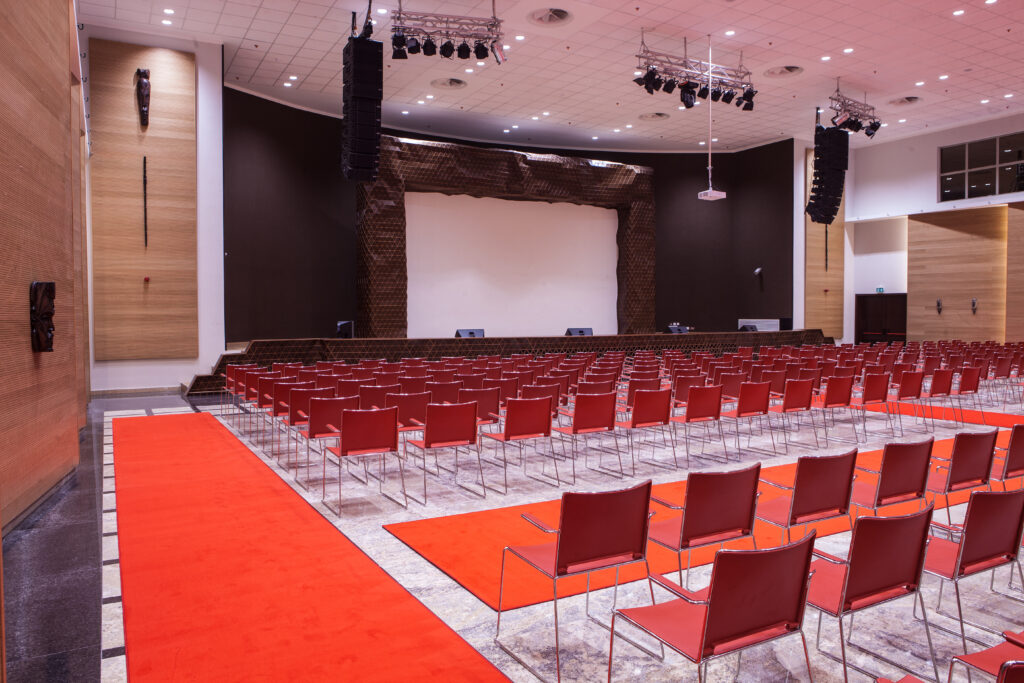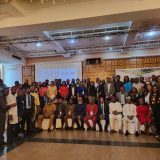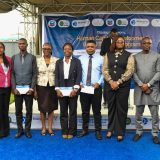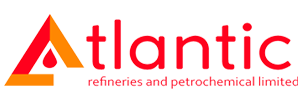Human Capital Development.
Investing in People to Drive Nigeria’s Energy Future.
The primary thrust of this unit is to drive competence-based, industry/job-ready and globally competitive Human Capital Development in the oil and gas industry and linkage sectors.

The Board’s Human Capital Development implementation strategy involves the following:

- Direct Intervention Human Capital Development (DIHCD)
The DIHCD involves the direct sponsorship of trainings by the Board for graduates and artisans in professional skills, technical and non-technical skills, vocational and entrepreneurial skills, soft/essential skills, and creative and innovative skills and competences.
The Board engages accredited and reputable industry training providers, training organizations and educational institutions with requisite capacities to provide Direct Intervention Human Capital Development services. The training/service providers are selected based on their capacity and capabilities of the subject matter in line with the provisions of the Public Procurement Act of 2007.

The 60-20-20 Strategic Training Model
The Nigerian Content Human Capital Development Direct Intervention Trainings shall be in line with the 60-20-20 Strategic Training Model adopted by the Board. The 60-20-20 Strategic Training Model provides that:
- 60% of NC-HCD Training shall be dedicated to employment creation and entrepreneurship development in the Oil and Gas Industry and linkage sectors. Accordingly, at least 60% of the beneficiaries of the training programmes shall have a line of sight to employment or shall be employed. Where there are limited space/opportunities for direct employment, adequate provision shall be made for starter pack to be provided for each of the trainees at the completion of the training to support viable entrepreneurship ventures.
- 20% of NC-HCD is for advanced/higher level training and certification for Nigerian personnel in the Oil and Gas Industry and linkage sectors, and Nigerians that have undergone some level of training but require advanced/higher level skills, competences and certifications.
- And 20% of NC-HCD is for basic/job entry level human capital development. This includes graduate and non-graduate trainings.
- Project-Based Human Capital Development (PBHCD)
Sections 10(1b), 28(1), 29, 30, and 37 of the NOGICD Act of 2010 requires all operators, contractors, sub-contractors and alliance partners to make provisions for training and give first consideration to Nigerians for training and employment during execution of projects/contracts in the Nigerian Oil and Gas Industry. In compliance with these provisions, all operators, contractors, sub-contractors and alliance partners are required to submit a detailed Employment and Training Plan to the plan for review and approval. This applies to every project/contract or group of contracts (including, call off contracts, routine service) with an umbrella ceiling ranging from One million Dollars ($1,000,000.00) and above in the Nigerian Oil and Gas Industry.

Training Budget Matrix
The table below shows the matrix in the determination of the training budget for Project-Based Human Capital Development.
Training Requirements
Project-Based Human Capital Development is carried out in line with the following:
- Project-Based Human Capital Development shall be on the back of contracts for Projects, Services and Procurement.
- The consideration and conceptualization of Project-Based Human Capital Development shall start at the ITT stage of projects/contracts, where a percentage of the total contract cost shall be set aside as training budget in line with the Training Budget Matrix, and shall be separated from the total project/contract cost or contractor cost.
- The approved training budget for Project-Based Human Capital Development may be utilized for other Human Capital Development initiatives/programmes, including development of training institutional capabilities in-country in terms of facilities, faculties, curriculum, technology and accreditation, to support the sustainable and continuous development of the requisite workforce needed to support the Oil and Gas Industry and linkage sectors. In this regard, part of the budget may be utilized for the upgrade and provision of training infrastructure, while the remaining portion shall be utilized in organizing refresher and competence-based training to support both the current and future projects in the Industry.
- The Training Implementation Proposal (TIP)/Human Capital Development Plan (HCDP) shall be developed and signed by the contractor and submitted by the operator/project promoter to the Board for review and approval. The TIP/HCDP shall be in line with the project/ contract scope, training budget, execution plan/schedule, skills and competences required for the delivery of the project/contract, and the provisions of this Guideline.
- The operator/project promoter shall ensure that the scope, curriculum/curricula and quality of the training are sufficient to equip trainees with skills and competences required for effective and seamless delivery of the subject project/contract and/or work ln the operator/project promoter or contractor’s organization, such that the operator/project promoter and contractor could readily and desirously employ the trainees after successful completion of the training.
- The total number of trainees for Project Based Human Capital Development (PBHCD) shall be determined by the training budget, skills and competency levels and certifications required.
- The training budget for Project-Based Human Capital Development shall not be used for operators/project promoters and contractors’ Corporate Social Responsibility (CSR) commitments/obligations. It is not also intended to address the community and social commitments of the operators/project promoters and contractors.
- Where the training budget is to be utilized for institutional upgrade or provision of training infrastructure, the Board shall approve the facility, scope of work and the implementation plan through a fair, competitive and transparent process.
- The selection of vendors for institutional facility upgrade shall follow the tender processes approved by the Board and compliant with the requirements of the Public Procurement Act of 2007.
- Candidates for Project-Based Human Capital Development shall be derived from the Nigerian Content Joint Qualification System in line with the provisions of the Guideline for Community Content and Sections 28(2) and 35 of the NOGICD Act of 2010.
- The operator/project promoter/contractor shall, for no reason whatsoever, commence the training without the formal approval of the Training Implementation Proposal (TIP)/Human Capital Development Plan (HCDP) through the issuance of an approval letter by the Board.
- The operator/project promoter/contractor shall not commence, or kick-off approved trainings without formally notifying the Board and without the Board’s participation at the kick-off ceremony.
- The operator/project promoter/contractor shall not close out any training programme without formally notifying the Board for approval and without the Board’s participation at the dose-out ceremony.
Requirements for TIP/HCDP Approval

The operator/project promoter/contractor shall submit to the Board the following:
- Approved/draft copy of the Nigerian Content Compliance Certificate (NCCC) for the project/contract.
- Detailed cost breakdown for both classroom training and on-the job/hands-on
- Detailed curriculum/curricula and/or training modules.
- Detailed training schedule for both classroom and on-the-job/hands-on tra’1ning, indicating the training modules’ delivery plan and required activities with specific timeline.
- Training Milestone Delivery Structure.
- Training Implementation Plan (TIP)/Human Capital Development Plan (HCDP) shall provide the following details:
- Detailed project scope.
- Total project man-hours.
- Total project/contract cost in USD.
- Total project/contract duration.
- Training man-hours.
- Training duration.
- Training budget/cost in USD using the Training Budget Matrix.
- Required candidates’ educational qualification(s) per training discipline.
- Platform for E-Learning for trainees where applicable.
- Shortlist of training providers, including address, phone and email details.
- Trainees’ employment and/or entrepreneurship development plan/strategy.
- Total number of trainees.
- Training disciplines/skills and competency levels.
- Relevant software applications to be used for the training.
- List of internationally recognized and Industry acceptable certifications trainees shall earn at the end of the trainings/Certifying Body.
- Provision for HSE, BOSIET and any other related trainings and requirements that will enable trainees work at onshore and offshore project site/locations
- Collaborative Human Capital Development (CHCD)
Collaborative Human Capital Development are initiatives facilitated by the Board in partnership with stakeholders such as NNPC, PTDF, PETAN, OGTAN, PTI, ITF, NDDC, IOCs, NOCs, Marginal Field Operators (MFO), Service Providers, Tertiary Institutions and any other entity/organization or government agencies. These initiatives are jointly sponsored by the Board and the collaborating stakeholders or sponsored absolutely by the collaborating stakeholders or the Board through the NCDF and budgetary provisions. They are also Capacity Development Initiatives (CDI) funded by stakeholders in the Oil and Gas Industry. The initiatives focus on training and support for the development of globally competitive Educational Institutions/System. The objective is to ensure that students in the Nigerian educational system are equipped with skills and competences to the extent that they may not require additional training intervention to qualify for entry level jobs in the Oil and Gas Industry and linkage sectors or ensure that they are field-ready.
Also, the Board develops and facilitates special strategic initiatives on the basis of mutual collaboration/partnership with the operators, contractors, service providers, alliance partners and other stakeholders for the training of Nigerian personnel working in the Oil and Gas Industry and linkage sectors, especially in highly technical/specialized skills and competences with critical gaps in-country. Such trainings are sponsored by the Board through the NCDF and budgetary provisions or joint-sponsored by the Board and the partnering stakeholders. The Board also maximizes opportunities for understudy of Expatriates/Succession Plan as provided in Section 31 (1) of the NOGICD Act of 2010 in collaboration with Planning, Research and Statistics Directorate of the Board, to build the skills, competences, capacities and capabilities of Nigerian personnel in the Oil and Gas Industry.
- Remedial Human Capital Development
Operators, Contractors and activity executors who were found not to have willfully and consistently violated the provisions of the act and who have demonstrated sufficient remorse to qualify for forbearance by the Board, shall be required to undertake approved Remedial Human Capital Development in accordance with the provisions of this guideline to make up for their non- compliance with the provisions of the act.
Remedial Human Capital Development (RHCD) includes initiative undertaken to address non-compliance with the provisions of the NOGICD Act of 2010 and Nigerian Content related matters by the operators, contractors, sub-contractors, service providers and alliance partners. The RHCD are dedicated to training of Nigerians in critical skills and competences and support for the development of globally competitive Educational Institutions/System in-country. The Board determines the type of initiative to be implemented in line with the aspirations of the NOGICD Act and the provisions of the Guideline for Nigerian Content Human Capital Development Implementation Strategy. The scope and duration of the trainings, number of trainees, certification(s) and training providers shall be approved by the Board. All RHCD shall be in alignment with the provisions of the HCD Guideline.
Nigerian Content Human Capital Development Training Framework
All Nigerian Content Human Capital Development (NC-HCD) Trainings shall consist of Classroom Training, Practical and On-The-Job/Hands-on Training, and Certification. The trainings shall cover Engineering, Sciences, Technical and Non-Technical Skills, Soft/Essential Skills, Vocational and Entrepreneurship Skills, Innovation Development and Business Incubation. The trainings shall be based on identified gaps and clearly defined needs, skills, competences and certifications. Also, the trainings shall be in alignment with Industry needs, rapidly changing technology and smart innovations, and globally competitive best practices. All certifications to be earned by trainees shall be internationally recognized and generally acceptable in the Industry. The NC-HCD shall focus on the Oil and Gas Industry and linkage sectors.
Duration for Nigerian Content Human Capital Development
The duration for Nigerian Content Human Capital Development (NC-HCD) shall include the duration needed for adequate classroom and practical training, on-the-job/hands-on training, as well as the duration needed to achieve agreed competences and certifications. The duration for Project-Based Human Capital Development Trainings shall be Twelve (12 Months) or the duration of the project/contract, whichever is longer. The duration for all NC-HCD Trainings shall be approved by the Board in line with the provisions of the Guideline for Nigerian Content Human Capital Development Implementation Strategy and globally competitive best practices.
Review and Approval of Training Plan
The Board shall review all Project-Based Human Capital Development Training Implementation Plans (TIP) submitted by the operators/project promoters and contractors, or any other Training Plan/Proposal submitted by collaborating stakeholders, consultants/training providers or institutions and revert with the reviewed copy within five (5) working days. The operators/project promoters, contractors, collaborating stakeholders, consultants/training providers or institutions shall update the Training Plan in line with the Board’s review/comments and revert within five (5) working days. The Board shall vet and/or review the Training Plan and if satisfied, issue approval letter to the operators/project promoters and contractors within One (1) week in the case of Project-Based Human Capital Development, Non-Compliance Human Capital Development and Collaborative Human Capital Development. If dissatisfied with the Training Plan, the Board shall invite the operators/project promoters, contractors or collaborating stakeholders for engagement and resolution of outstanding issues. Thereafter, the operators/project promoters, contractors or collaborating stakeholders shall update the Training Plan in line with the resolution and revert for approval within One week.

Nigerian Content Human Capital Development Training Framework

All NC-HCD Trainings shall include Nigerian Content Awareness and Entrepreneurship Modules. The Nigerian Content and Entrepreneurship Modules shall be compulsory for all trainees. This is intended deliberately to equip the trainees with basic and relevant knowledge on Nigerian Content and Entrepreneurial skills. The Nigerian Content Module may be facilitated by resource persons from the Board, especially where the training provider is unable to provide competent and experienced facilitators to handle the module to the satisfaction of the Board.
The scope of the Entrepreneurship Module shall be as stated in the Training Implementation Proposal (TIP). As part of the training, each trainee shall be required to prepare business plans/proposals, including funding/financial plan, marketing plan and sustainable business management framework/strategy. Also, the trainees shall be taught how to source for fund/finance from the banks and other funding entities/Venture capitalists.
Qualification for Candidates for NC-HCD Trainings
Candidates’ qualification for Project-Based Human Capital Development Trainings shall be in line with the qualification requirements stated in the Training Implementation Proposal (TIP} approved by the Board, and the provisions of the Guideline for Nigerian Content Human Capital Development Implementation Strategy. For other NC-HCD Trainings, candidates’ qualification shall be based on the qualification (s} required for the trainings. Apart from the academic qualifications, all candidates for NC-HCD Trainings must be registered on the Nigerian Oil and Gas Industry Content Joint Qualification System (NOGIC JQS) Portal.
Nomination of Candidates for NC-HCD Trainings
The Board shall nominate candidates for all NC-HCD Trainings from the NOGIC JQS Portal and ensure compliance with the Guideline for Community Content (i.e. minimum of 50% candidates from the project catchment areas. Also, the Board shall ensure national spread in the nomination of candidates for NC-HCD Trainings. Nomination of candidates for NC HCD Trainings shall be based on the qualification(s} required for the trainings, and the maximum ratio of three to one (3:1) to ensure enough candidates and fair competition at the selection exercise. Nomination of candidates for Project-Based Human Capital Development Trainings shall be in line with the requirements in the approved Training Implementation Proposal.
The candidates shall be subjected to selection exercise by the contractor in collaboration with the operator/project promoter or collaborating stakeholders and the Board. The selection exercise shall comprise of written test and oral interview. The percentage pass mark for the written test and oral interview shall be determined by the parties involved. The written test shall be Computer-Based Test (CBT} or Non-Computer-Based Test (NCBT} as may be determined by the Board. Only the candidates that passed the written test shall qualify for the oral interview based on the jointly established pass mark. Also, only the candidates that passed the oral interview based on the jointly established pass mark, and certified medically fit, shall be invited to participate in the training. No selection exercise shall take place without formal notification by the operator/contractor or collaborating stakeholders and involvement of the Board. The Board shall jointly sign-off the results of the written test and oral interview and the list of successful candidates. The Board shall ensure sustainable transparency, fairness and reliability in the nomination of candidates and selection process.
To be considered for the NC-HCD trainings, candidates must first be registered in the Board’s Nigerian Oil and Gas Industry Content Joint Qualification System (NOGIC JQS) Portal. To register, kindly click NOGIC JQS Portal
NC-HCD Trainings Data
To view the list of Beneficiaries of our Training programmes, click here
To view the list of our Ongoing Training programmes, click here
To view data on employment created through our Training programmes, click here
To view photobook of our Training programmes, click here
To view the list of completed Trainings, click here
To view the Guideline for Nigerian Content Human Capital Development Implementation Strategy, click here
For Frequently Asked Questions (FAQ), click here

Marine Vessel Reports
View and download Marine Vessel Reports of indigenous marine firms

Nigerian Content Act
Download the Nigerian Oil and Gas Industry Content Development (NOGICD) Act, 2010
Nigerian Content Tower, Yenagoa, Bayelsa State.






